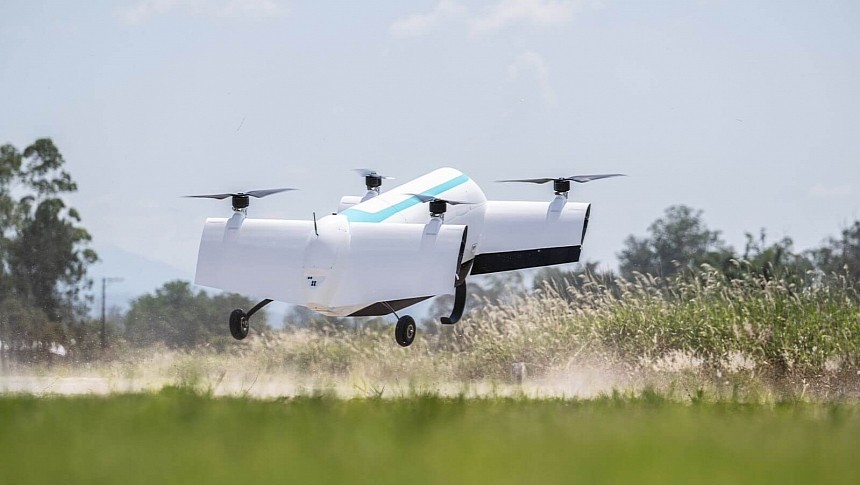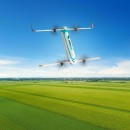Moya Aero is a young air mobility company with the ambitious goal of revolutionizing cargo operations in Brazil and beyond with the help of a heavy-duty self-flying eVTOL (electric vertical takeoff and landing).
The express delivery market is continually growing across the world, including in Brazil. On the other hand, FINEP, a government institution that supports research and innovation, was actively involved in financing Moya Aero's aircraft prototype. That's because the adoption of new technologies is one of the most important factors linked to the growth of cargo services while also aiming for the net zero target.
The Brazilian company is ending the year on a high note. Last month was an exciting time for its CEO, Alexandre Zaramela, who designed the Moya eVTOL. On November 15, he coordinated the first flight of his aircraft prototype, a high-capacity autonomous drone.
The flight took place on the outskirts of Sao Jose dos Campos and was the first in a series of complex flight tests. Moya is now entering the certification phase, with hopes to kick off commercial service by 2026.
Moya Aero may be young, but its parent company is not. ACS Aviation is linked to several trailblazing projects, including SORA-e, the first piloted electric aircraft that was built and flown in the Southern Hemisphere (2015), and the first certified Light Sport Aircraft in China, in cooperation with the Chinese aviation authorities.
The Moya eVTOL was meant to become the first autonomous, fully-electric air vehicle with a high capacity built in the Southern Hemisphere. It targets the general logistics industry and agricultural businesses for crop dusting. It was designed as a more efficient, zero-emission alternative to small drones operating in agriculture and the cargo sector.
This autonomous drone with a 23-foot (7-meter) wingspan boasts a range of more than 100 km (68 miles) on a single charge combined with a 200 kg (441 lbs) payload. When it comes to agricultural operations, it can carry up to 160 liters (42 gallons) and claims to increase crop dusting productivity up to six times due to its increased spraying precision.
In addition to the higher payload and upgraded precision, the Moya cargo drone boasts the benefit of emission-free operations, and it’s also said to be much more cost-effective than conventional helicopters.
Although commercial operations aren't expected to start earlier than 2026, the manufacturer has also secured a significant order backlog, with letters of intent for the purchase of more than 100 units. Of course, this is just the beginning. Moya believes it will roll out and sell more than 1,000 units in the next years, adding up to a revenue in excess of $2 billion.
For now, the Brazilian cargo eVTOL is gearing up for an intensive phase of test flights that will confirm its pioneering status in the entire region.
The Brazilian company is ending the year on a high note. Last month was an exciting time for its CEO, Alexandre Zaramela, who designed the Moya eVTOL. On November 15, he coordinated the first flight of his aircraft prototype, a high-capacity autonomous drone.
The flight took place on the outskirts of Sao Jose dos Campos and was the first in a series of complex flight tests. Moya is now entering the certification phase, with hopes to kick off commercial service by 2026.
Moya Aero may be young, but its parent company is not. ACS Aviation is linked to several trailblazing projects, including SORA-e, the first piloted electric aircraft that was built and flown in the Southern Hemisphere (2015), and the first certified Light Sport Aircraft in China, in cooperation with the Chinese aviation authorities.
The Moya eVTOL was meant to become the first autonomous, fully-electric air vehicle with a high capacity built in the Southern Hemisphere. It targets the general logistics industry and agricultural businesses for crop dusting. It was designed as a more efficient, zero-emission alternative to small drones operating in agriculture and the cargo sector.
This autonomous drone with a 23-foot (7-meter) wingspan boasts a range of more than 100 km (68 miles) on a single charge combined with a 200 kg (441 lbs) payload. When it comes to agricultural operations, it can carry up to 160 liters (42 gallons) and claims to increase crop dusting productivity up to six times due to its increased spraying precision.
In addition to the higher payload and upgraded precision, the Moya cargo drone boasts the benefit of emission-free operations, and it’s also said to be much more cost-effective than conventional helicopters.
Although commercial operations aren't expected to start earlier than 2026, the manufacturer has also secured a significant order backlog, with letters of intent for the purchase of more than 100 units. Of course, this is just the beginning. Moya believes it will roll out and sell more than 1,000 units in the next years, adding up to a revenue in excess of $2 billion.
For now, the Brazilian cargo eVTOL is gearing up for an intensive phase of test flights that will confirm its pioneering status in the entire region.








